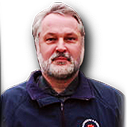Mine was a crooked path into science.
I grew up in Germany. My dad died when I was young and my mom worked, running a
barbershop in (city) with my older brother. As a kid I loved games – making up my own games
– and sports. Sports have always been big for me. I’m into soccer and volleyball. Growing up in the 60s I was also inspired by the Apollo Program and that got me into rocket launching. I joined the Oberth Society in Germany – that was a club named for Hermann Oberth, a rocketry pioneer of the early 20th century. The Oberth Society intended to prepare future space scientists and engineers, and for while that involved building rockets. This is how I became something of an expert on explosives.
School was another matter. In Germany, school is very different than in the U.S. It’s very rigid.
Basically career choices are made very early on and you take classes that prepare you for your future occupation. Not everyone goes to college. After high school you might go to a technical school instead. I went to high school but I wasn’t very good at languages. Latin completely vexed me. I was also very interested in girls and that was a distraction. I wasn’t a good student and I ended up getting kicked out and had to repeat middle school when I was 15 years old. My mom wanted me to be better educated and do well in school. The second time through middle school I did better and was able to enter a technical program in high school. That put me on course to go on to a technical school for engineering after graduation.
But nothing really happens in a straight line. I played soccer professionally, and I entered the military. It was after these experiences that I decide I wanted to go to university and study physics (astrophysics?). I was fortunate to receive a Fulbright Scholarship (?) and that’s when I came to the U.S. to attend the University of California at Santa Cruz.
Kids often think scientists are these guys from television with funny glasses and white shirts who do the kind of things they have to memorize to pass a test. Scientists don’t do science for the sole reason of creating factoids for textbooks. They’re playing a game just the way the soccer players play a game. But in science, the game has greater impact on society than sports.
